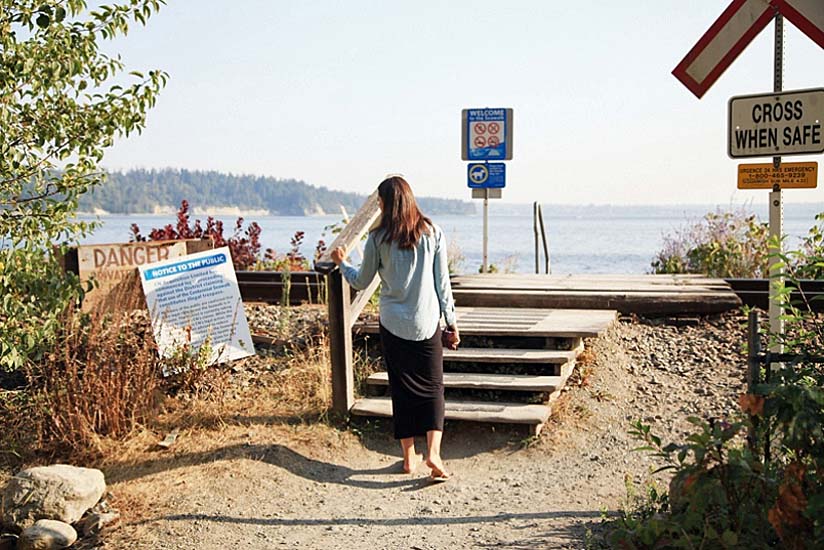
The District of West Vancouver squared off with Canadian National Railway (CN) in a downtown hearing room Wednesday over who has the right to control access to West Vancouver's popular waterfront Seawalk and how much the municipality should pay for that.
In one corner, a lawyer for the municipality told members of a Canadian Transportation Agency panel the railway had attempted to "hold the community to ransom" by demanding payments of $3.7 million in rent for a one kilometre section of the Seawalk where the public path encroaches on CN's right-of-way.
District lawyer Ian MacKay asked the panel to grant West Vancouver permanent access to that section of right-of-way at no cost, arguing a railway company shouldn't be allowed to thwart municipal interests in providing a public amenity that's been in place for 50 years.
In the other corner, a lawyer for CN told the panel nobody should be left with the impression the railway wants to shut down the seawall.
The issue is about money, said lawyer Doug Hodson.
"The real dispute between the parties relates to what is the fair market value of rent that should be paid for use of CN property," he said.
"They're asking you to effectively rewrite the lease with more favourable terms for West Vancouver."
The CN lawyer argued that should be decided in the regular courts, not by the transportation agency.
The two sides have been locked in a legal fight over the seawall, after talks about a new lease agreement broke down.
The municipality built the Seawalk 50 years ago to mark Canada's 100th birthday.
CN holds a lease on land over which a small portion of the Seawalk is built.
In February, an arm of the railway company filed a lawsuit in B.C. Supreme Court against the municipality, stating that CN had cancelled the district's lease and asking for an injunction preventing the District of West Vancouver from trespassing on the land.
The lawsuit also seeks damages for the district's use of the land and for overdue rental payments.
The municipality fired back with an application asking the Canadian Transportation Agency, a quasi-judicial federal agency that oversees railway operations, for an order allowing the municipality continued use of the Seawalk at no cost.
On Wednesday, MacKay told the three-member panel it's ironic that during Canada's 150th celebrations, the municipality is fighting for the continued right to use the walkway built to mark the country's 100th birthday.
MacKay argued there is long-established legal precedent that prevents railways from interfering in community development.
In today's terms, that includes West Vancouver's "top notch" recreational path, he said.
MacKay said the Seawalk was built with the support of the previous lease holder, BC Rail.
CN also benefited when the municipality rebuilt the Seawalk and replaced the riprap that supports both the Seawalk and the rail right-of-way at a cost of $4.85 million, he added.
MacKay acknowledged the municipality has not paid any rent since 1994.
He said CN has never provided a reason as to why the company has asked for $3.7 million in rent annually.
West Vancouver offered to pay $12,500 a year.
The land in question can't be developed under current zoning, which only provides for uses like wharfs, buoys, and other marine foreshore uses, he said.
McKay said in previous decisions the Canadian Transportation Agency has not required payment for public access unless the access has resulted in damage to railway property.
But CN lawyer Doug Hodson called that an "extraordinary remedy," amounting to expropriation of the land by the municipality without any payment.
Hodson argued the municipality is improperly trying to use the transportation agency to circumvent the lawsuit over the lease, which should be handled by a regular court.
He added CN has not prevented continued use of the Seawalk by West Vancouver residents while the issues are under dispute.
He said CN has also offered the district the appointment of an independent third-party to determine the value of the rent.
Jane Seyd.
(because there was no image with original article)
*2. Original news article image replaced.
(usually because it's been seen before)
under the provision in Section 29
of the Canadian Copyright
Modernization Act.











